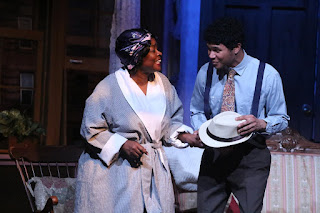By Ruth Ross
The Old Settler is a play and a production worthy of The Playhouse’s illustrious past. Written by John Henry Redwood and masterfully directed by Di Shawn J. Gandy, this domestic drama tells the story of what happens over the course of about a month in 1943 when a young man from rural South Carolina rents a room in a Harlem apartment inhabited by two middle-aged sisters, one separated from her husband, the other a spinster. The sibling rivalries and sexual tensions unleashed by this odd living arrangement make for a touching and intense theatrical experience, one so human that it transcends time and race to resonate with us all.
Roy Pancirov’s authentic-looking, neat and tidy provides the perfect canvas for the messy events that unfold before our eyes. The claustrophobia of three adults living within the tight confines of a small apartment permeates the stage. Evoking a sense of time and place, Joe DeVico’s sound design incorporates popular music by Duke Ellington and Louis Armstrong; his use of a series of radio programs that meld one into the other cleverly and seamlessly conveys the passage of time. And the costumes by Ann Lowe and Ruth Scott look as if they’ve stepped off the pages of 1943 issues of Life or Look magazines! (Above L-R: Diane L. Parker, Karen Stefano, Rachelle Dorce Carey)
Redwood’s script is so well-crafted that, unlike most plays, the second act maintains the dramatic tension of the first. Surprising secrets hinted at are slowly revealed, and stage business that first appears to be random plays out in unexpected ways. Fortunately, the actors delivering Redwood’s dialogue are so comfortable and natural that we forget we are watching a play and instead feel like Peeping Toms, sneaking a peak through the walls and windows of the apartment, much in the same way that the sisters can witness the goings-on in the emergency room of the hospital across the street.
Through much of the first act, sisters, Elizabeth (Bess) and Quilly, Diane L. Parker and Karen Stefano, respectively, quibble and quarrel convincingly over (mostly) trivial things. Stefano adeptly uses her body language and expressive face to register her dislike or disapproval on a myriad of topics, whether it is the dress a corpse wore or how it looks to the women of the church for the sisters to invite a male boarder in their home. Parker’s face is more placid, for she is sure that what she is doing is right: It helps pay the bills. “When folks start paying my rent, I’ll start worrying what people say,” she tells a skeptical Quilly. As her relationship with her young roomer blossoms, Parker’s Bess giggles and acts like a teenager when the young man calls her on the telephone at the beginning of the second act. It’s uncomfortable to watch a 40-something spinster (e.g., an “old settler”) act this way, but it’s sad too, for the audience already suspects that this won’t end well. (Left, above: Stefano and Parker)
As the boarder—named, ironically, Husband—Derek Simmons ably conveys the country bumpkin who tries to become a “hip cat” only to look like “a runaway from a minstrel show,” as Quilly so succinctly puts it. A mama’s boy, Marsh’s Husband is the perfect mark for an ambitious young woman named Charmaine/Lou Bessie to order around and to use as a money tree. She is played with great vigor by Rachelle Dorce Carey (top image), who sashays into Bess’s apartment and life like she owns both and throws shade at the older woman like grenades. We feel the sting of her taunts as they hit Bess full in the face—gasping when she goes after the older woman’s physical appearance and age, yet the revelation of her dreams engenders sympathy for her character. (Above, right: Parker and Derek Simmons)
In my long association with the Summit Playhouse, I have been pleased to see this venerable troupe undertaking plays far beyond the usual familiar fare of local theaters. This production is innovative and risk-taking—indeed, the term tour de force is appropriate here. The Old Settler is theater in the classic sense: none of the characters is evil, but all have character faults that lead them to make poor choices and bring about their own downfalls. Fortunately, unlike those Greek tragedies, no one in this play dies —unless you count dreams.
The Old Settler will be performed Friday and Saturday evenings at 8 PM and Sunday afternoons at 2 PM through March 5. The Summit Playhouse is located at 10 New England Avenue in Summit. For information and tickets, call the box office at 908.273.2192 or visit www.summitplayhouse.org online.


